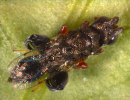Scientific name
Dirhinus anthracia Walker
Taxonomic position
Hymenoptera: Chalcidoidea: Chalcididae
Diagnosis
Body robust, dorsum dark brown to black with strong metallic coppery reflections; antennae and first two pairs of legs reddish brown, last pair or legs blackish, except tarsi reddish brown. Head with a pair of horn-like anterior projections, each horn outside of apex with a distinct notch; anterior and dorsal edges of horns converging in acute to right angle, anterior and lateral edges forming acute angle of about 60 degrees. Propodeum with a median areola with convex sides. First abdominal tergite with longitudinal striae in anterior half reaching up to about one-third length. Hind femora greatly enlarged and swollen.
 Head, dorsal view Head, dorsal view
Images

 Adult, dorsal view Adult, dorsal view
 Adult, ventral view Adult, ventral view
Distribution
Throughout India. Pakistan.
Biology / Hosts
Parasitic on synathropic flies (Diptera: Muscidae, Sarcophagidae, Calliphoridae) and other dipterous hosts such as Tephritidae and Tachinidae; Lepidoptera (Narendran, 1989). Mass produced and used augmentatively in the biological control of Indian Uzi fly, Exorista bombycis, a pest of Bombyx
mori.
References
- Boucek, Z. and Narendran, T.C. 1981. Indian chalcid wasps (Hymenoptera) of the genus Dirhinus parasitic on synanthropic and other Diptera. Systematic Entomology, 6:
229-251.
- Narendran, T.C. 1989. Oriental Chalcididae (Hymenoptera: Chalcidoidea). Zoological Monograph, Department of Zoology, University of Calicut, Kerala. 440 p.
|